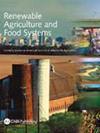Contextual realities and poverty traps: why South Asian smallholder farmers negatively evaluate conservation agriculture
IF 2
3区 农林科学
Q2 AGRICULTURE, MULTIDISCIPLINARY
引用次数: 4
Abstract
Abstract Conservation agriculture-based sustainable intensification (CASI) is gaining prominence as an agricultural pathway to poverty reduction and enhancement of sustainable food systems among government and development actors in the Eastern Gangetic Plains (EGP) of South Asia. Despite substantial investment in research and extension programs and a growing understanding of the agronomic, economic and labor-saving benefits of CASI, uptake remains limited. This study explores farmer experiences and perspectives to establish why farmers choose not to implement CASI systems despite a strong body of recent scientific evidence establishing the benefits of them doing so. Through thematic coding of semi-structured interviews, key constraints are identified, which establishes a narrative that current households' resources are insufficient to enable practice change, alongside limited supporting structures for resource supplementation. Such issues create a dependency on subsidies and outside support, a situation that is likely to impact any farming system change given the low-risk profiles of farmers and their limited resource base. This paper hence sets out broad implications for creating change in smallholder farming systems in order to promote the adoption of sustainable agricultural technologies in resource-poor smallholder contexts, especially with regard to breaking the profound poverty cycles that smallholder farmers find themselves in and which are unlikely to be broken by the current set of technologies promoted to them.背景现实和贫困陷阱:为什么南亚小农户对保护性农业持负面评价
摘要基于保护性农业的可持续集约化(CASI)作为一种减少贫困和加强可持续粮食系统的农业途径,在南亚东部恒河平原(EGP)的政府和发展参与者中日益突出。尽管在研究和推广项目上进行了大量投资,并且人们越来越了解CASI的农艺、经济和节省劳动力的好处,但其应用仍然有限。本研究探讨了农民的经验和观点,以确定为什么农民选择不实施CASI系统,尽管最近有大量科学证据证明了他们这样做的好处。通过半结构化访谈的主题编码,确定了关键的制约因素,它确立了一种说法,即当前家庭的资源不足以实现实践变革,同时资源补充的支持结构有限。这些问题造成了对补贴和外部支持的依赖,鉴于农民的低风险状况及其有限的资源基础,这种情况可能会影响任何农业制度的改变。因此,本文阐述了在资源匮乏的小农户环境中改变小农户耕作制度以促进采用可持续农业技术的广泛意义,特别是在打破小农所处的深刻贫困循环方面,目前向他们推广的一套技术不太可能打破这种循环。
本文章由计算机程序翻译,如有差异,请以英文原文为准。
求助全文
约1分钟内获得全文
求助全文
来源期刊

Renewable Agriculture and Food Systems
农林科学-农业综合
CiteScore
5.20
自引率
7.40%
发文量
39
审稿时长
>36 weeks
期刊介绍:
Renewable Agriculture and Food Systems (formerly American Journal of Alternative Agriculture) is a multi-disciplinary journal which focuses on the science that underpins economically, environmentally, and socially sustainable approaches to agriculture and food production. The journal publishes original research and review articles on the economic, ecological, and environmental impacts of agriculture; the effective use of renewable resources and biodiversity in agro-ecosystems; and the technological and sociological implications of sustainable food systems. It also contains a discussion forum, which presents lively discussions on new and provocative topics.
 求助内容:
求助内容: 应助结果提醒方式:
应助结果提醒方式:


